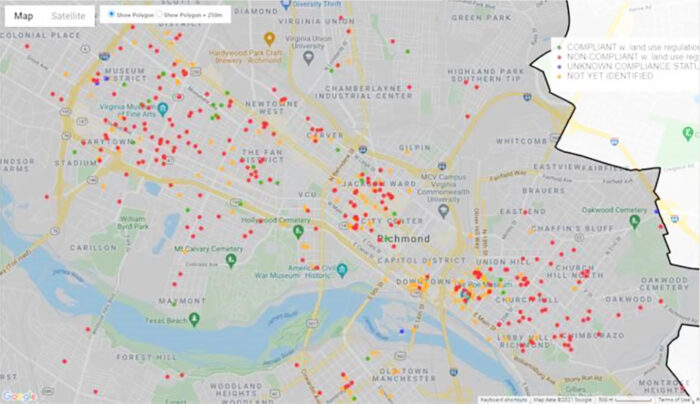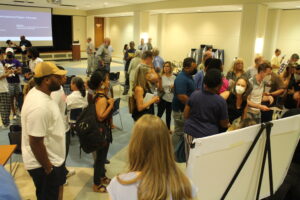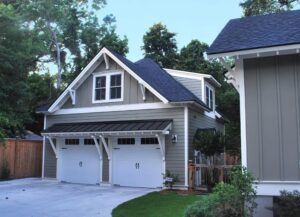
A 2022 map of identified short-term rentals in the city show the greatest concentrations in the Fan and Museum districts, Jackson and Monroe wards, Church Hill and Shockoe. (BizSense file)
A long-awaited update to Richmond’s regulations for short-term home rentals is hitting the home stretch.
Proposed changes to the city’s zoning ordinance relating to short-term rentals (STRs) were introduced at Monday’s City Council meeting and are headed to the Planning Commission for consideration at its next meeting, Aug. 21.
The amendment has been in the works since early last year and has been planned since the city adopted its current rules in mid-2020. Officials said at the time they would revisit the rules after a year to see how operators perform and tweak the ordinance as needed.

More than 700 people attended a series of initial meetings on the three zoning changes in August. (BizSense file photo)
Delayed because of the pandemic, the amendment effort has been part of a trio of proposed zoning changes to regulations relating to STRs, accessory dwelling units (ADUs) and minimum parking requirements. The parking regulations were repealed earlier this year, and proposed rules to permit ADUs in additional zoning districts has been making the rounds and is scheduled to go to council Sept. 18.
For the Airbnb-style STRs, city planners initially recommended eliminating a primary residency requirement in which operators must reside at the property being rented for at least half the year.
The requirement had been a point of contention for operators who rent out more than one property. In drafting the rules in place now, officials had said the requirement was needed to prevent the possibility of operators buying up multiple properties in residential districts and using them as essentially minihotels.
With the amendment, planners are proposing to retain the residency requirement in all residential zoning districts, but to remove the requirement in nonresidential districts.
Other proposed changes include an increased fee for biennial STR permits, doubled from $300 currently to $600. Renters would be allowed to be STR operators if the unit is their primary residence, whereas currently only property owners can operate STRs.
And for multifamily properties such as apartment buildings and condos, a maximum of one-third of the units or 10, whichever is lesser, would be permissible as STRs, whereas such properties are currently not specifically regulated.
Other existing rules would remain unchanged. STRs would still be permitted as entire dwellings or units and as individual rooms, with a maximum of five sleeping rooms and no limit on the number of rental nights a year.
No more than one booking transaction during the same period is permitted, and operators must be 18 years of age or older and must submit floor plans showing locations of smoke detectors, fire extinguishers and carbon monoxide detectors.
Proposed with the amendment is the potential addition of two full-time employees to assist with zoning administration and enforcement. Transient occupancy tax will start being collected directly from rental platforms such as Airbnb and Vrbo, which in turn would provide the city with STR addresses to improve enforcement.
Staff had been planning to propose the new STR rules separately and after the new rules for accessory dwelling units (ADUs), but feedback from the public and City Council members prompted the proposals to be timed closer together.
ADUs – also referred to as accessory apartments, secondary suites or “granny flats” – have been in discussion since late 2019, when the Planning Commission asked staff to study the appropriateness and feasibility of the smaller attached or detached dwellings located on the same lot as a residence.
ADUs are viewed as allowing individuals to age in place, accommodating people with special needs, creating lower-priced housing and providing residents with rental opportunities to supplement income. The city’s master plan, adopted in late 2020, recommends updating the zoning ordinance to allow ADUs by right with form-based requirements in all residential zones as a way to encourage more housing types across the city.
With STRs, in a memo accompanying the proposed rule changes, planning staff acknowledge concerns from residents that STRs in residential neighborhoods could change the character of the area and affect quality of life.
“In addition, short-term rentals can increase the housing shortage and housing prices in the city,” the memo states. “… The continuation of the primary residency requirement in all residential zoning districts will help preserve existing dwelling units in the city. The proposed STR regulations will enhance tourism and provide income opportunities while protecting the character of residential neighborhoods.”
The STR proposals were referred to the Planning Commission’s Aug. 21 meeting. The commission typically meets twice a month but has cancelled its Aug. 7 meeting.

A 2022 map of identified short-term rentals in the city show the greatest concentrations in the Fan and Museum districts, Jackson and Monroe wards, Church Hill and Shockoe. (BizSense file)
A long-awaited update to Richmond’s regulations for short-term home rentals is hitting the home stretch.
Proposed changes to the city’s zoning ordinance relating to short-term rentals (STRs) were introduced at Monday’s City Council meeting and are headed to the Planning Commission for consideration at its next meeting, Aug. 21.
The amendment has been in the works since early last year and has been planned since the city adopted its current rules in mid-2020. Officials said at the time they would revisit the rules after a year to see how operators perform and tweak the ordinance as needed.

More than 700 people attended a series of initial meetings on the three zoning changes in August. (BizSense file photo)
Delayed because of the pandemic, the amendment effort has been part of a trio of proposed zoning changes to regulations relating to STRs, accessory dwelling units (ADUs) and minimum parking requirements. The parking regulations were repealed earlier this year, and proposed rules to permit ADUs in additional zoning districts has been making the rounds and is scheduled to go to council Sept. 18.
For the Airbnb-style STRs, city planners initially recommended eliminating a primary residency requirement in which operators must reside at the property being rented for at least half the year.
The requirement had been a point of contention for operators who rent out more than one property. In drafting the rules in place now, officials had said the requirement was needed to prevent the possibility of operators buying up multiple properties in residential districts and using them as essentially minihotels.
With the amendment, planners are proposing to retain the residency requirement in all residential zoning districts, but to remove the requirement in nonresidential districts.
Other proposed changes include an increased fee for biennial STR permits, doubled from $300 currently to $600. Renters would be allowed to be STR operators if the unit is their primary residence, whereas currently only property owners can operate STRs.
And for multifamily properties such as apartment buildings and condos, a maximum of one-third of the units or 10, whichever is lesser, would be permissible as STRs, whereas such properties are currently not specifically regulated.
Other existing rules would remain unchanged. STRs would still be permitted as entire dwellings or units and as individual rooms, with a maximum of five sleeping rooms and no limit on the number of rental nights a year.
No more than one booking transaction during the same period is permitted, and operators must be 18 years of age or older and must submit floor plans showing locations of smoke detectors, fire extinguishers and carbon monoxide detectors.
Proposed with the amendment is the potential addition of two full-time employees to assist with zoning administration and enforcement. Transient occupancy tax will start being collected directly from rental platforms such as Airbnb and Vrbo, which in turn would provide the city with STR addresses to improve enforcement.
Staff had been planning to propose the new STR rules separately and after the new rules for accessory dwelling units (ADUs), but feedback from the public and City Council members prompted the proposals to be timed closer together.
ADUs – also referred to as accessory apartments, secondary suites or “granny flats” – have been in discussion since late 2019, when the Planning Commission asked staff to study the appropriateness and feasibility of the smaller attached or detached dwellings located on the same lot as a residence.
ADUs are viewed as allowing individuals to age in place, accommodating people with special needs, creating lower-priced housing and providing residents with rental opportunities to supplement income. The city’s master plan, adopted in late 2020, recommends updating the zoning ordinance to allow ADUs by right with form-based requirements in all residential zones as a way to encourage more housing types across the city.
With STRs, in a memo accompanying the proposed rule changes, planning staff acknowledge concerns from residents that STRs in residential neighborhoods could change the character of the area and affect quality of life.
“In addition, short-term rentals can increase the housing shortage and housing prices in the city,” the memo states. “… The continuation of the primary residency requirement in all residential zoning districts will help preserve existing dwelling units in the city. The proposed STR regulations will enhance tourism and provide income opportunities while protecting the character of residential neighborhoods.”
The STR proposals were referred to the Planning Commission’s Aug. 21 meeting. The commission typically meets twice a month but has cancelled its Aug. 7 meeting.




Very helpful and interesting article! Where did you get the map of identified short-term rentals? Thanks!
The list of non-compliant “red” dot properties will now double as I bet lot of apartment rental units will get added. I wonder if we will still have around only 10% compliance with the updated regulation?? Especially given the fee doubling. Also it will be interesting to see what the City does once it get addresses of those renting spaces and now forced to pay the transient tax through their listing agency (AirBnB, Vbro, etc) but are not registered. Will the City actively start a major enforcement/crackdown?
With the city working with the platform (Vrbo, Airbnb), the city can simply request the platform to suspend bookings for the property until the owner is fully licensed. No license= no bookings. Shut down.
You have a lot of faith in the city staff and the platforms! City will simply get a transfer of funds with records that indicate what properties are paying those taxes. The problem, as the city has had since the beginning, is even if you can identify the property, you have to go to the process of proving the unit is in violation of a city zoning ordinance and convict the owner of that violation before any platform is going to remove the listing. Sone city’s where is 100% illegal to do AirBNB still have hundreds of listings. There’s an… Read more »
Now if only the city would enforce this the way they enforce parking violations.
They don’t really enforce those either – very neighborhood dependent